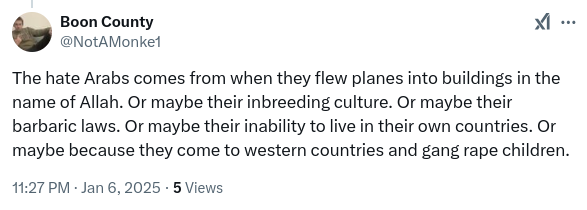#### **Analysis Under EU Law:**
- **Hate Speech:** Under EU law, particularly the 2008 Framework Decision on combating certain forms of expressions of racism and xenophobia, public incitement to violence or hatred based on race, colour, religion, descent, or national or ethnic origin is illegal. The post targets Arabs with broad, derogatory generalizations, which can be seen as inciting hatred based on ethnicity and religion. This content could be considered a violation of Article 1 of the Framework Decision, which requires Member States to criminalize such behavior.
- **Defamation/Insult:** The post uses terms like "inbreeding culture" and "barbaric laws," which not only generalize but also defame and insult an entire ethnic group. While defamation laws vary across EU countries, many consider public insults against groups to be actionable, especially when they perpetuate harmful stereotypes.
- **Civic Discourse:** The EU emphasizes the importance of civic discourse, especially in the context of democratic values. The post undermines this by promoting a narrative that fosters division and hostility. The EU's commitment to combating hate speech extends to protecting the quality of public debate, which this post harms by spreading discriminatory views.
#### **Analysis Under X/Twitter Terms of Service (TOS):**
- **Hateful Conduct Policy:** X's TOS explicitly prohibits hate speech, which they define as content that promotes violence against or directly attacks or threatens people based on protected categories including race, ethnicity, and religion. The post directly attacks Arabs, attributing negative traits and behaviors to the entire group, which clearly violates this policy.
- **Abuse and Harassment:** The mention of "gang rape" in the context of Arabs migrating to Western countries can be seen as an attempt to harass or intimidate based on ethnicity, aligning with X's policy against abuse and harassment. This kind of statement could be interpreted as spreading fear or inciting negative stereotypes, which Twitter aims to curb through its policies.
- **Content Moderation:** X has implemented policies under Elon Musk's leadership to combat hate speech by deboosting and demonetizing negative/hate tweets. The post in question would likely fall under these measures, aiming to reduce its reach and impact on the platform. However, the content's severity might warrant more direct action like removal or suspension.
- **Public Interest and Safety:** X, like many social media platforms, has a responsibility to ensure the safety of its users, particularly in preventing the spread of harmful content that could lead to real-world discrimination or violence. This post not only endangers the social fabric by promoting divisive rhetoric but also could be seen as neglecting the platform's duty to protect public interest.
#### **Conclusion:**
The content of the post is problematic under both EU law and X/Twitter's Terms of Service. Under EU law, it falls into categories of illegal hate speech, defamation, and undermining civic discourse due to its discriminatory nature and incitement of hatred against Arabs. From X's perspective, it breaches policies on hateful conduct, abuse, and harassment, contributing to a toxic environment on the platform. Reporting this post as EU illegal content could lead to a detailed review considering both EU legal standards and X's internal policies, potentially resulting in its removal or the application of platform-specific penalties like content deboosting or account suspension.
This analysis highlights the dual importance of addressing such content not just from a platform governance standpoint but also from a legal perspective, ensuring that social media platforms operate within the framework of laws designed to protect human rights and promote equality.
